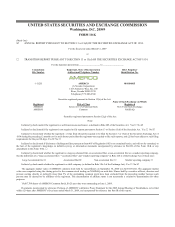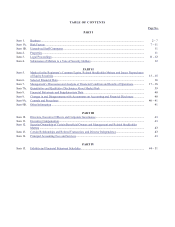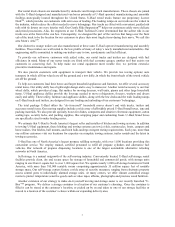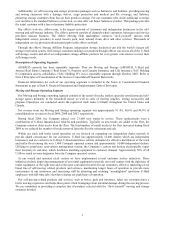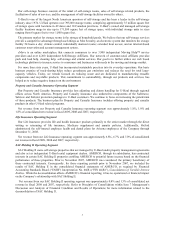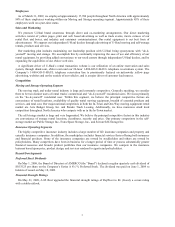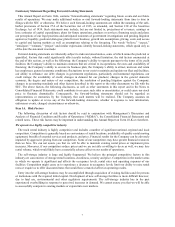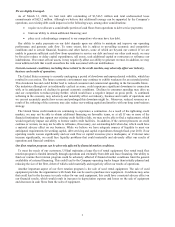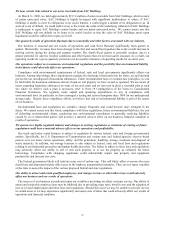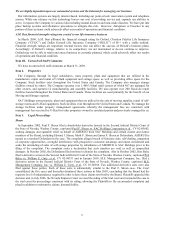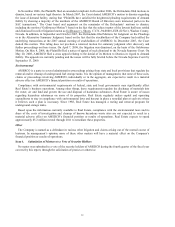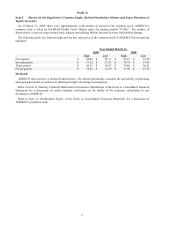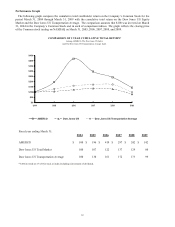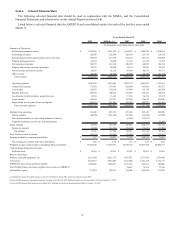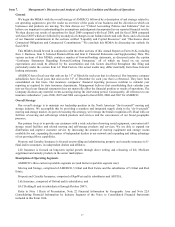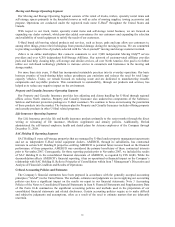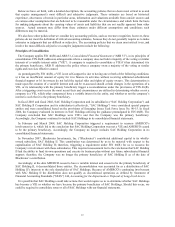U-Haul 2009 Annual Report Download - page 14
Download and view the complete annual report
Please find page 14 of the 2009 U-Haul annual report below. You can navigate through the pages in the report by either clicking on the pages listed below, or by using the keyword search tool below to find specific information within the annual report. 10
We bear certain risks related to our notes receivable from SAC Holdings.
At March 31, 2009, we held approximately $197.6 million of notes receivable from SAC Holdings, which consist
of junior unsecured notes. SAC Holdings is highly leveraged with significant indebtedness to others. If SAC
Holdings is unable to meet its obligations to its senior lenders, it could trigger a default of its obligations to us. In
such an event of default, we could suffer a loss to the extent the value of the underlying collateral of SAC Holdings
is inadequate to repay SAC Holding’s senior lenders and our junior unsecured notes. We cannot assure you that
SAC Holdings will not default on its loans to its senior lenders or that the value of SAC Holdings assets upon
liquidation would be sufficient to repay us in full.
Our quarterly results of operations fluctuate due to seasonality and other factors associated with our industry.
Our business is seasonal and our results of operations and cash flows fluctuate significantly from quarter to
quarter. Historically, revenues have been stronger in the first and second fiscal quarters due to the overall increase in
moving activity during the spring and summer months. The fourth fiscal quarter is generally weakest, due to a
greater potential for adverse weather conditions and other factors that are not necessarily seasonal. As a result, our
operating results for a given quarterly period are not necessarily indicative of operating results for an entire year.
Our operations subject us to numerous environmental regulations and the possibility that environmental liability
in the future could adversely affect our operations.
Compliance with environmental requirements of federal, state and local governments significantly affects our
business. Among other things, these requirements regulate the discharge of materials into the water, air and land and
govern the use and disposal of hazardous substances. Under environmental laws or common law principles, we can
be held liable for hazardous substances that are found on real property we have owned or operated. We are aware of
issues regarding hazardous substances on some of our real estate and we have put in place a remedial plan at each
site where we believe such a plan is necessary, refer to Note 19 Contingencies of the Notes to Consolidated
Financial Statements. We regularly make capital and operating expenditures to stay in compliance with
environmental laws. In particular, we have managed a testing and removal program since 1988 for our underground
storage tanks. Despite these compliance efforts, we believe that risk of environmental liability is part of the nature
of our business.
Environmental laws and regulations are complex, change frequently and could become more stringent in the
future. We cannot assure you that future compliance with these regulations, future environmental liabilities, the cost
of defending environmental claims, conducting any environmental remediation or generally resolving liabilities
caused by us or related third parties will not have a material adverse effect on our business, financial condition or
results of operations.
We operate in a highly regulated industry and changes in existing regulations or violations of existing or future
regulations could have a material adverse effect on our operations and profitability.
Our truck and trailer rental business is subject to regulation by various federal, state and foreign governmental
entities. Specifically, the U.S. Department of Transportation and various state and federal agencies exercise broad
powers over our motor carrier operations, safety, and the generation, handling, storage, treatment and disposal of
waste materials. In addition, our storage business is also subject to federal, state and local laws and regulations
relating to environmental protection and human health and safety. The failure to adhere to these laws and regulations
may adversely affect our ability to sell or rent such property or to use the property as collateral for future
borrowings. Compliance with changing regulations could substantially impair real property and equipment
productivity and increase our costs.
The Federal government likely will institute some sort of carbon cap. This will likely affect everyone who uses
fossil fuels and disproportionately affect users in the highway transportation industries. There are too many variables
at this time to assess the impact of the various proposed federal and state regulations.
Our ability to attract and retain qualified employees, and changes in laws or other labor issues could adversely
affect our business and our results of operations.
The success of our business is predicated upon our workforce providing excellent customer service. Our ability to
attract and retain this employee base may be inhibited due to prevailing wage rates, benefit costs and the adoption of
new or revised employment and labor laws and regulations. Should this occur we may be unable to provide service
in certain areas or we may experience significantly increased costs of labor that could adversely affect our results of
operations and financial condition.


